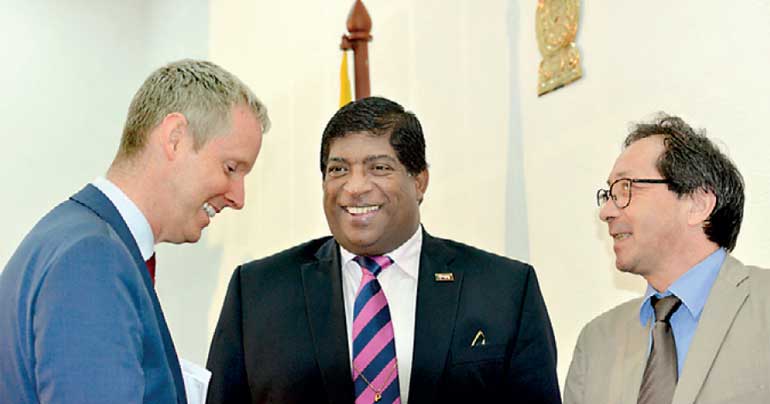Monday Feb 16, 2026
Monday Feb 16, 2026
Wednesday, 29 March 2017 01:33 - - {{hitsCtrl.values.hits}}

Finance Minister Ravi Karunanayake (centre) sharing a light moment with EIB Vice President Andrew McDowell (left) and European Union Ambassador to Sri Lanka and the Maldives Tung-LaïMargue after the press conference held at the Finance Ministry in Colombo yesterday - Pic by Daminda Harsha Perera
By Charumini de Silva
The European Investment Bank (EIB) yesterday pledged to support Sri Lanka with its new investments and in sectors that are crucial for the transformation of the country.
The high-level visiting delegation from the EIB, led by its Vice President Andrew McDowell, stressed that the organisation intended to strengthen relations with key partners in Sri Lanka and to enable more engagement in supporting future projects in the country.
McDowell highlighted that the discussions held with Prime Minister Ranil Wickremesinghe and other senior government ministers had led to the identification of a number of additional sectors targeted for transformational investments in the country.
“I can confirm that the EIB’s financial experts and technical experts in Luxemburg will examine these investment projects in detail to see how the EIB could play an active role and contribute further to sustainable development in Sri Lanka,” McDowell told journalists at a press briefing held at the Finance Ministry in Colombo yesterday.
Given the vision of the Government and fruitful discussions held yesterday, he expects the new projects to be identified and confirmed by the latter part of the year.
Noting that the bank had already lent around EUR 300 million, he explained that the modus operandi of the EIB is to mobilise additional investment from other partners including the private sector, thereby creating multiple effects on every euro invested.
After the discussions held yesterday with the Government he said that there were two areas they had prioritised - additional infrastructure and private sector development across the country.
McDowell assured that the bank would provide the most competitive rates depending on the type of project.
“EIB rates are very competitive and project-dependent. The interest rates would have an effect on the country’s overall macroeconomic rating. However, the benefits will be passed on to the promoters either in the form of reduced rates or in the longer maturity. That’s the proposition it works,” he added.
In January, the EIB agreed to provide EUR 50 million-EUR 115 million to support the improvement and expansion of sewage networks across Colombo. The loan will help the Colombo Municipal Council (CMC) achieve its goal of providing full sanitation coverage to benefit people living and working in the greater Colombo area and represented the EIB’s fifth sovereign loan to the country.
“The progress that has been made by the CMC in upgrading to the waste water infrastructure required in the southern catchment of the city is commendable. This will benefit millions people living in the city. Our next set of discussions is to focus on the northern catchment areas. We have to assess the EIB’s contribution financially and technically,” he noted.
Stating that the EIB had its regional office based in New Delhi, he said that they intended to have a more visible presence on the ground, examining and supporting projects in the country.
EU Ambassador to Sri Lanka and the Maldives Tung LaïMargue believes that the visit of the EIB has been a unique opportunity for the Sri Lankan Government to showcase its plans for the sustainable development of the country and was very timely as it persuades the strengthening of the EU-Sri Lanka partnership.
He emphasised that the discussion held with Premier Wickremesinghe focused on a lot of issues and particularly on the Megapolis project.
“The Prime Minister was perfectly in line with the idea that there could be interesting projects. We are still at the technical level of looking at these opportunities. The job is more for the EIB to determine the priorities in these areas. The Premier also announced that there will be a sustainable development plan issued sometime in May, which will also help us to identify more specific projects,” he said.
According to him the EU has earmarked a sum of EUR 210 million for Sri Lanka from 2014-2020.
“We are increasingly working with common objectives of the EIB and EU in the way we are funding projects. We are looking at a more collective approach in funding projects, where it will have a combination of grants and loans. The EU can provide grants and EIB can provide loans,” LaïMargue stated.
The Ambassador outlined that they were very interested in investments around environment protection and combating climate change.
Following the promising meetings held with the Prime Minister, along with other ministers, he said: “I am confident it will be possible for the EIB in the future to make more investments in Sri Lanka and to attract to its label, importantly, more private investors.”
Finance Minister Ravi Karunanayake said the EIB deciding to play an active role in Sri Lanka was a testament to how keen and committed they were.
“As the Government, my President and the Prime Minister have spearheaded a new journey in Sri Lanka. Democracy that was flickering in the country is now at its ‘seven- star’ level. With that we have a necessity to have the economic growth that takes place. Any assistance that comes in is really appreciated,” he stressed.
Commenting on the interest rate hikes, Karunanayake said the country was a leaf caught in cyclonic winds. “When the Federal Reserve increases its rates, we small nations are automatically caught up in the process. But I am sure we have been withstanding certain things and friends like the EIB and all coming in here will help us out on external resources and reserves in a much more pleasant way with a stronger basis to withstand the cyclonic trends which take place time to time.”